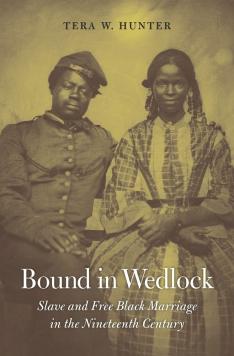
The author: Tera W. Hunter is Professor of History and African American Studies at Princeton University.
Opening lines: Henry “Box” Brown fled slavery in Richmond, Virginia, via a custom-made dry goods box sent through the U.S. mail service in 1849. The box was only big enough to hold his six-foot, two-hundred-pound frame, curled up into a fetal position, along with a flask of water and a few biscuits. He mailed himself safely to Philadelphia, Pennsylvania, where he arrived twenty-seven hours later. The tale of his innovative escape is perhaps all that current-day readers know about him. But his testimony of life as a slave was the subject of broadsides, posters, and as-told-to memoir, all mass-produced and circulated throughout Northern states and abroad during his lifetime. Brown’s escape was so motivated by the disruption of marital bonds and family life suffered by so many slaves in antebellum America.
From an early age, Brown’s mother had taught him about the forced separations common among slave families: “She would take me upon her knee and, pointing to the forest trees which were then being stripped of their foliage by the winds of autumn, would say to me, my son, as yonder leaves are stripped from off the trees of the forest, so are the children of the slaves swept away from them by the hands of cruel tyrants.” And yet nothing could prepare him for the trauma that he would endure firsthand. By the time he was fifteen, after the death of his master, his family members were redistributed as inheritances among the slaveholder’s heirs. His sisters and brothers were sent in different directions. He was initially left with his parents on the plantation before being sent to work in a tobacco factory in Richmond.
Given his experience, what would make Henry Box Brown consider starting a family of this own as an adult? Like so many other young men, he put rationality aside when he met a woman, Nancy. He believed they could build a life together as a married couple. They obtained the consent of their masters — Christians, after all — who promised not to sell them away from each other. But within a year’s time, Brown reported, his owner’s “conscientious scruples vanished” and he sold Nancy to “an exceedingly cruel man” and to a “still more cruel woman.” Brown’s growing family was sold several more times but eventually ended up in the hands of a prospective buyer who offered Brown a deal: if he would pay a portion of her sale price, the man would keep his wife nearby and sell her back to him once he had saved enough money. The promise began to unravel, as Nancy’s latest master demanded increasingly more money. Still, Brown was willing to pay to maintain even a tenuous hold on a domestic life with his wife and, by then, three children. Eventually Brown, a hire-out slave, could not keep up with the owner’s unreasonable demands, given that he had to turn over the greater part of his earnings to his own master.
Reviews: “In this extraordinary book, Tera Hunter builds on vast research to discern the resilient marriage forms that African Americans devised during the nineteenth century to cope with the havoc of bondage, the fleeting promise of emancipation, and the fresh compulsions that came with freedom. Written with eloquence, teeming with evidence, comprehensive in its sweep, challenging in its conclusions, Bound in Wedlock is a momentous achievement.”—Sydney Nathans, author of A Mind to Stay: White Plantation, Black Homeland

